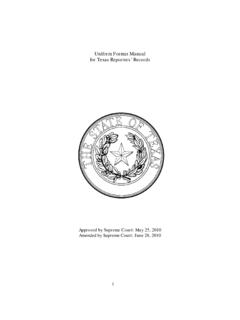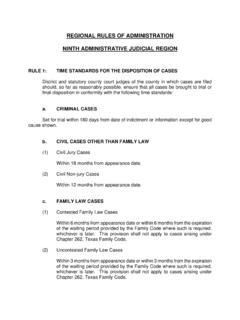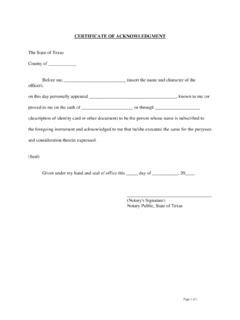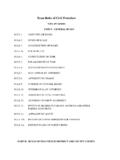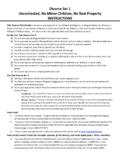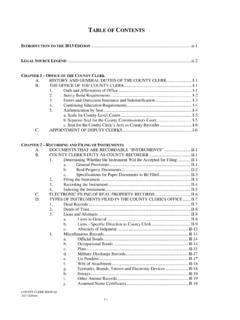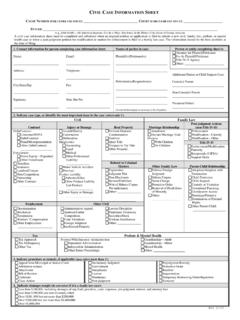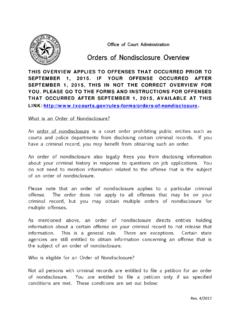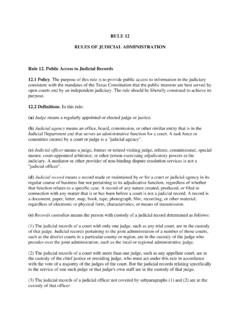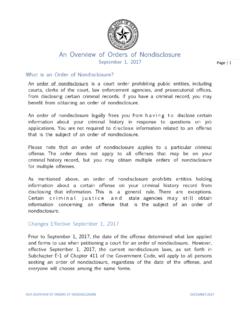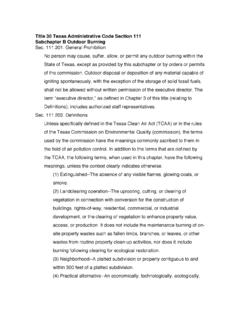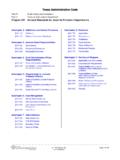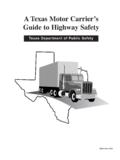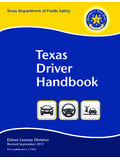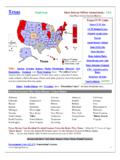Transcription of Texas Code of Judicial Conduct - txcourts.gov
1 1 Texas code OF Judicial Conduct (As amended by the Supreme Court of Texas through August 22, 2002) Preamble Our legal system is based on the principle that an independent, fair and competent judiciary will interpret and apply the laws that govern us. The role of the judiciary is central to American concepts of justice and the rule of law. Intrinsic to all sections of this code of Judicial Conduct are the precepts that judges, individually and collectively, must respect and honor the Judicial office as a public trust and strive to enhance and maintain confidence in our legal system. The judge is an arbiter of facts and law for the resolution of disputes and a highly visible symbol of government under the rule of law.
2 The code of Judicial Conduct is not intended as an exhaustive guide for the Conduct of judges. They should also be governed in their Judicial and personal Conduct by general ethical standards. The code is intended, however, to state basic standards which should govern the Conduct of all judges and to provide guidance to assist judges in establishing and maintaining high standards of Judicial and personal Conduct . Canon 1: Upholding the Integrity and Independence of the Judiciary An independent and honorable judiciary is indispensable to justice in our society. A judge should participate in establishing, maintaining and enforcing high standards of Conduct , and should personally observe those standards so that the integrity and independence of the judiciary is preserved.
3 The provisions of this code are to be construed and applied to further that objective. Canon 2: Avoiding Impropriety and the Appearance of Impropriety in All of the Judge s Activities A. A judge shall comply with the law and should act at all times in a manner that promotes public confidence in the integrity and impartiality of the judiciary. B. A judge shall not allow any relationship to influence Judicial Conduct or judgment. A judge shall not lend the prestige of Judicial office to advance the private interests of the judge or others; nor shall a judge convey or permit others to convey the impression that they are in a special position to influence the judge.
4 A judge shall not testify voluntarily as a character witness. C. A judge shall not knowingly hold membership in any organization that practices discrimination prohibited by law. 2 Canon 3: Performing the Duties of Judicial Office Impartially and Diligently A. Judicial Duties in General. The Judicial duties of a judge take precedence over all the judge's other activities. Judicial duties include all the duties of the judge's office prescribed by law. In the performance of these duties, the following standards apply: B. Adjudicative Responsibilities. (1) A judge shall hear and decide matters assigned to the judge except those in which disqualification is required or recusal is appropriate.
5 (2) A judge should be faithful to the law and shall maintain professional competence in it. A judge shall not be swayed by partisan interests, public clamor, or fear of criticism. (3) A judge shall require order and decorum in proceedings before the judge. (4) A judge shall be patient, dignified and courteous to litigants, jurors, witnesses, lawyers and others with whom the judge deals in an official capacity, and should require similar Conduct of lawyers, and of staff, court officials and others subject to the judge's direction and control. (5) A judge shall perform Judicial duties without bias or prejudice.
6 (6) A judge shall not, in the performance of Judicial duties, by words or Conduct manifest bias or prejudice, including but not limited to bias or prejudice based upon race, sex, religion, national origin, disability, age, sexual orientation or socioeconomic status, and shall not knowingly permit staff, court officials and others subject to the judge's direction and control to do so. (7) A judge shall require lawyers in proceedings before the court to refrain from manifesting, by words or Conduct , bias or prejudice based on race, sex, religion, national origin, disability, age, sexual orientation or socioeconomic status against parties, witnesses, counsel or others.
7 This requirement does not preclude legitimate advocacy when any of these factors is an issue in the proceeding. (8) A judge shall accord to every person who has a legal interest in a proceeding, or that person's lawyer, the right to be heard according to law. A judge shall not initiate, permit, or consider ex parte communications or other communications made to the judge outside the presence of the parties between the judge and a party, an attorney, a guardian or attorney ad litem, an alternative dispute resolution neutral, or any other court appointee concerning the merits of a pending or impending Judicial proceeding.
8 A judge shall require compliance with this subsection by court personnel subject to the judge's direction and control. This subsection does not prohibit: (a) communications concerning uncontested administrative or uncontested procedural matters; (b) conferring separately with the parties and/or their lawyers in an effort to mediate or settle matters, provided, however, that the judge shall first give notice to all parties and not thereafter hear any contested matters between the parties except with the consent of all parties; 3(c) obtaining the advice of a disinterested expert on the law applicable to a proceeding before the judge if the judge gives notice to the parties of the person consulted and the substance of the advice, and affords the parties reasonable opportunity to respond; (d) consulting with other judges or with court personnel; (e) considering an ex parte communication expressly authorized by law.
9 (9) A judge should dispose of all Judicial matters promptly, efficiently and fairly. (10) A judge shall abstain from public comment about a pending or impending proceeding which may come before the judge's court in a manner which suggests to a reasonable person the judge's probable decision on any particular case. This prohibition applies to any candidate for Judicial office, with respect to Judicial proceedings pending or impending in the court on which the candidate would serve if elected. A judge shall require similar abstention on the part of court personnel subject to the judge's direction and control.
10 This section does not prohibit judges from making public statements in the course of their official duties or from explaining for public information the procedures of the court. This section does not apply to proceedings in which the judge or Judicial candidate is a litigant in a personal capacity. (11) A judge shall not disclose or use, for any purpose unrelated to Judicial duties, nonpublic information acquired in a Judicial capacity. The discussions, votes, positions taken, and writings of appellate judges and court personnel about causes are confidences of the court and shall be revealed only through a court's judgment, a written opinion or in accordance with Supreme Court guidelines for a court approved history project.
